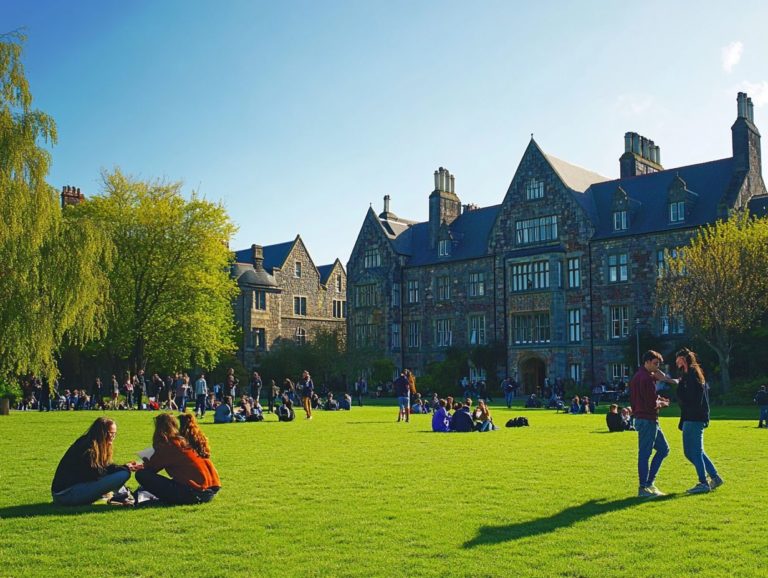Living Costs for Students in Japan: A Breakdown
Navigating the financial landscape as a student in Japan can feel overwhelming at times.
Understanding the different costs of living is essential for effective budgeting and financial planning. This guide meticulously breaks down the key expenses housing, food, transportation, and other necessities offering you a clear picture of what lies ahead.
This guide provides practical tips to help you save money while studying. Whether you’re a local or an international student, you will gain valuable insights needed to manage your finances wisely in Japan.
Contents
- Key Takeaways:
- Housing Costs
- Food and Dining Expenses
- Transportation Costs
- Other Necessary Expenses
- Tips for Saving Money as a Student in Japan
- Frequently Asked Questions
- What are the average living costs for students in Japan?
- What is the breakdown of living costs for students in Japan?
- Are there any ways for students to save on living costs in Japan?
- What is the cost of living in Tokyo compared to other cities in Japan?
- Are there any hidden costs that students should be aware of when living in Japan?
- How can international students manage their living costs in Japan?
Key Takeaways:

- Housing in Japan varies widely; shared apartments are popular.
- Save on food by cooking at home and using student discounts.
- Public transportation is the best way to save money.
Overview of Living Expenses for Students
Understanding the living expenses for international students in Japan, especially in bustling cities like Tokyo, Osaka, and Kyoto, is essential for your financial planning as you embark on this study abroad adventure. You ll find that factors like tuition fees (the cost of your courses), accommodation costs, and daily expenses can greatly influence your budget. It’s vital to look beyond the obvious costs and be aware of those hidden expenses that might arise during the academic year.
Discover budgeting tips that will help you save and enjoy your time in Japan! Prepare a clear budget that includes not just tuition fees, but also a range of accommodation options from shared apartments to dormitories. Daily expenses such as groceries, transportation, and leisure activities can vary significantly, impacting your overall spending.
Part-time job opportunities, particularly in language schools or cafes, can be a lifesaver in offsetting costs and providing some much-needed financial relief. It s wise to set aside funds for unexpected expenses, like medical bills or travel, to ensure a smoother experience.
By crafting a detailed budget that tracks your monthly costs against your income, you can navigate your financial landscape with greater confidence, allowing you to fully immerse yourself in the vibrant culture of Japan.
Housing Costs
Housing costs constitute a substantial part of your overall living expenses as an international student in Japan, and they can vary significantly depending on your location. Major cities like Tokyo, Osaka, and Kyoto present a wide array of accommodation options, each offering distinct price ranges and amenities.
Grasping these costs is essential for effective budgeting, particularly if you’re studying at institutions like Tokyo eCampus. It’s important to explore different housing possibilities whether shared apartments, dormitories, or private rentals to discover an affordable solution that aligns with your financial situation while considering your personal preferences and proximity to your educational facilities.
Act now to explore your housing options and save money for your adventures in Japan!
Types of Housing Options
International students in Japan have a variety of housing options, including shared apartments, dormitories, and private rentals. Each option is tailored to meet different needs and budgets.
Choosing a shared apartment can be a smart choice. It allows you to split rent and extra costs like water and electricity with fellow students, significantly lightening your financial load. Plus, communal living often leads to lasting friendships and support networks that enhance your overall stay.
You may face challenges like sharing responsibilities and navigating different lifestyles, but those experiences can be part of the adventure.
On the other hand, dormitories offer a more structured living environment. They are perfect for those who thrive on routine and appreciate easy access to campus amenities. While dorms tend to be more budget-friendly, they often come with the downside of limited privacy and flexibility.
If independence is what you seek, private rentals might be just the ticket. They provide the freedom to personalize your living space and enjoy solitude. However, this option comes with a higher price tag and the added responsibility of managing rental agreements and maintenance.
It s crucial to weigh these factors against your priorities and budget to find the best fit for your lifestyle.
Average Rent Prices
The average rent prices for housing in Japan can vary dramatically depending on the city and specific location. Tokyo generally holds the crown for the highest costs. If you’re a student looking to settle in major cities like Osaka, Kyoto, or Fukuoka, it’s crucial to know that your choice of accommodation will significantly impact your rent.
In Tokyo, for instance, a one-bedroom apartment in a central area might set you back up to 150,000 per month. However, you could find more affordable shared accommodations for around 50,000, which is much more suitable for a student budget. On the other hand, Fukuoka offers a more wallet-friendly living situation, with average monthly rent for similar spaces hovering around 80,000.
Keep in mind that amenities like internet and utilities can also sway the overall costs. When you’re close to universities, rent tends to climb, as students often prioritize convenience over other factors. By considering these elements, you can make educated decisions that align with your academic goals and financial situation.
Food and Dining Expenses

Food and dining expenses play a pivotal role in the overall living costs for international students in Japan. You ll need to factor in both grocery shopping and the expenses linked to dining out, particularly in bustling urban centers like Tokyo and Osaka, where meal prices can be quite diverse.
As you budget for food, it’s important to find a harmonious balance between home-cooked meals and indulging in the local culinary scene. This not only nourishes you but also enriches your cultural experience. Therefore, understanding the average costs associated with groceries and dining out becomes essential for navigating your financial landscape while studying abroad.
Start your research today!
Cost of Groceries and Eating Out
The cost of groceries and dining out in Japan can vary significantly by city, shaping your budget. For instance, grocery prices in Tokyo differ from those in Osaka or Kyoto due to regional differences and item availability.
Dining out can be a delightful experience, but it can also put a dent in your wallet if you re not careful. It’s wise to explore local eateries for some authentic cuisine while keeping a close eye on your spending. Striking a balance between home-cooked meals and the occasional restaurant visit allows you to immerse yourself in the culture without breaking the bank.
In cities like Sapporo or Fukuoka, you might find that fresh produce is more affordable compared to the bustling streets of Tokyo, thanks to local farming practices and seasonal availability. On average, expect to spend around 30,000 to 50,000 monthly on groceries, while a casual meal out can cost anywhere from 800 to 2,500.
Don t miss out on student discounts or special lunch menus they re waiting for you! These options can let you savor local flavors without exceeding your financial limits. Understanding these food pricing nuances empowers you to make informed choices about your food experiences while fully embracing Japanese culture.
Transportation Costs
Transportation costs are crucial for you as an international student living in Japan. The efficient public transportation systems are essential for navigating vibrant cities like Tokyo, Osaka, and Kyoto.
Utilizing options such as trains, subways, and buses greatly impacts your monthly expenses. It s essential to choose the most economical travel solutions. The JR Tokyo Wide Pass, for instance, provides unlimited travel on select lines, making it a savvy choice for frequent commuters.
By grasping the nuances of transportation costs, you ll budget more effectively and explore Japan with confidence and ease.
Public Transportation Options
Public transportation in Japan stands out for its remarkable efficiency and extensive network, giving you exciting options like trains, subways, and buses to navigate cities effortlessly.
The JR Tokyo Wide Pass offers unlimited travel within designated zones, making it a fantastic choice for those who frequently venture around the greater Tokyo area. Familiarizing yourself with these options allows you to make informed decisions that align with your commuting needs and budget.
Along with the JR Pass, local subway lines, like the Toei Subway in Tokyo, provide a variety of punctual routes for short distances. While subway fares can be economical, they can add up quickly if you’re commuting daily. On the flip side, buses can take you to areas that trains might miss, and they tend to be slightly cheaper, although they often face delays during rush hours.
Whichever option you choose, consider getting a Suica or Pasmo card for efficient contactless payments and seamless transfers across different modes of transportation. This simple addition can significantly enhance your travel experience.
With a range of options available to suit various needs, navigating the public transit system can become a breeze, allowing you to explore Japan with confidence and ease.
Average Monthly Transportation Expenses
The average monthly transportation expenses for students in Japan can fluctuate significantly, influenced by factors such as your location, how often you travel, and your preferred modes of transportation. Typically, you should budget around 10,000 to 20,000 each month for public transportation costs, depending on your travel habits and the city s transportation infrastructure.
Effectively managing these expenses is essential as you navigate daily commutes and weekend adventures while studying abroad. Cities like Tokyo might require a heftier budget due to their extensive subway and train networks, while smaller towns may present more wallet-friendly options.
To keep your costs manageable, consider utilizing student discount passes, which can lead to significant savings. Planning your journeys ahead of time can help you avoid last-minute rides that tend to pile up. Exploring alternatives like cycling or walking not only trims down your transportation expenses but also adds a touch of fitness to your routine.
Finding that sweet spot between budgeting and enjoying your leisure activities can cultivate a fulfilling and enriching experience during your studies.
Other Necessary Expenses

Along with housing and food, you must also factor in various other essential expenses that can significantly influence your overall budget as an international student in Japan. Utility costs think electricity, water, and internet are crucial components that require your attention. Don’t forget about health insurance premiums, particularly the required National Health Insurance for residents.
Stay alert for hidden expenses that may arise, ensuring you are well-prepared for daily costs that could impact your financial stability throughout your studies.
Utilities, Health Insurance, and Other Essentials
Utility costs, health insurance, and other essential expenses significantly impact your monthly budget as an international student residing in Japan. You ll need to account for utility expenses such as electricity and water, which typically range from 10,000 to 15,000 per month. Don t overlook mandatory health insurance like the National Health Insurance, which provides vital medical coverage.
Understanding these costs is fundamental for effective financial planning and ensuring you re well-prepared for your daily needs while studying abroad. Be sure to include internet and gas bills in your overall utility budget, contributing an additional 5,000 to 10,000 monthly.
To manage these expenses smoothly, consider budgeting strategies such as:
- Utilizing expense-tracking apps
- Creating a detailed monthly budget
- Identifying potential savings areas, like shopping at local markets for groceries.
By prioritizing essential costs and taking advantage of student discounts, you can effectively manage your finances while enjoying your academic journey in Japan. Start budgeting early to enjoy a worry-free experience!
Tips for Saving Money as a Student in Japan
Saving money as a student in Japan demands savvy budgeting and strategic cost-cutting measures to manage the numerous expenses that come with living and studying abroad. By adopting practical budgeting tips, you can skillfully navigate daily expenditures from grocery shopping to transportation while still indulging in leisure activities and enriching cultural experiences.
Consider part-time work for essential financial support, easing your living costs and enhancing your overall study abroad journey, all while allowing you to immerse yourself in the vibrant tapestry of Japanese culture.
Start planning your budget now to maximize your experiences in Japan!
Budgeting and Cost-Cutting Strategies
Implementing effective budgeting and cost-cutting strategies is crucial for international students managing daily expenses and accommodation costs in Japan. By tracking your spending, you can maximize your financial resources and fully enjoy your study abroad adventure!
Japan’s living costs are typically high. For example, consider sharing accommodation with roommates. This simple choice can significantly reduce your monthly rent. Additionally, using apps to monitor your spending provides a clearer picture of where your money is going each month.
When it comes to food, shopping at local markets or discount grocery stores offers fresher ingredients and allows you to prepare nutritious meals without overspending. Explore free or low-cost cultural events to enhance your experience without straining your budget. This transforms budgeting from a necessity into an opportunity for smarter living.
Frequently Asked Questions
What are the average living costs for students in Japan?

The average living cost for students in Japan is around 120,000 to 150,000 yen per month. This includes rent, utilities, food, transportation, and other necessities.
What is the breakdown of living costs for students in Japan?
Rent makes up the largest portion of living costs, averaging around 50,000 to 70,000 yen per month. Other expenses, such as food and transportation, account for the rest.
Are there any ways for students to save on living costs in Japan?
Yes! Students can save by living in a dormitory or shared apartment, cooking at home, and taking advantage of student discounts for transportation and other expenses.
What is the cost of living in Tokyo compared to other cities in Japan?
Tokyo has a higher cost of living than other cities in Japan. Students can expect to pay around 30,000 to 50,000 yen more per month for living expenses in Tokyo.
Besides basic living costs, students should budget for additional expenses like textbooks, school supplies, and miscellaneous costs. Careful planning is essential to avoid financial surprises!
How can international students manage their living costs in Japan?
International students can apply for scholarships and part-time jobs to help manage their living costs. Researching and comparing prices can help find affordable options for housing, food, and other necessities.






